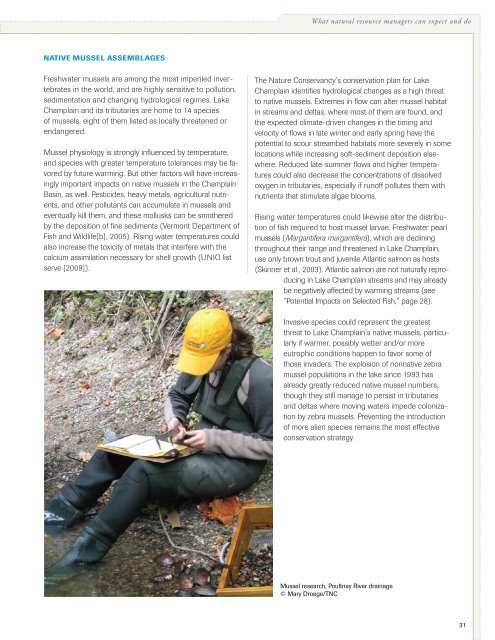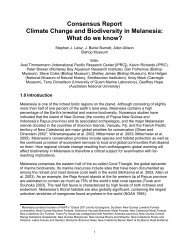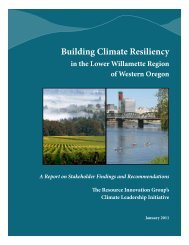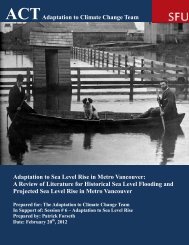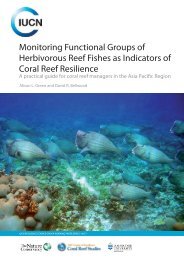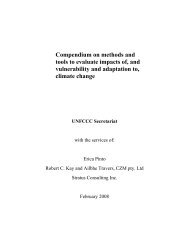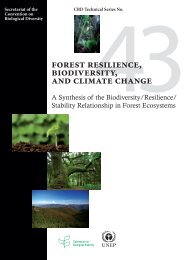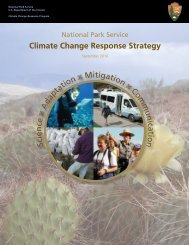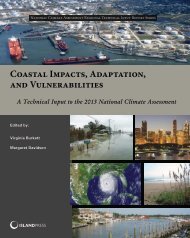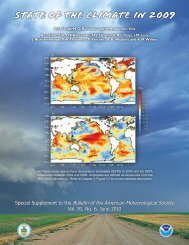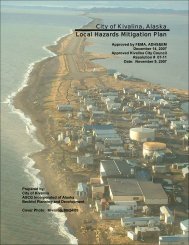<strong>Climate</strong> <strong>Change</strong> <strong>in</strong> <strong>the</strong> Champla<strong>in</strong> Bas<strong>in</strong><strong>The</strong>se fish apparently rema<strong>in</strong> offshore for most of <strong>the</strong> year butenter shallow waters <strong>in</strong> late spr<strong>in</strong>g and early summer to spawn.If <strong>the</strong>y do not have a long warm season <strong>in</strong> which to ga<strong>in</strong> weight,alewives do not survive cold w<strong>in</strong>ters, which sometimes leads tomassive seasonal die-offs <strong>in</strong> <strong>the</strong> Great Lakes (Lepak and Kraft,Channel darter (Perc<strong>in</strong>a copelandi)2008). In w<strong>in</strong>ter <strong>the</strong>y become stressed at temperatures colderthan 37°F (2.8°C), and <strong>the</strong>y generally try to avoid habitats at orbelow 34°F (1°C) [O’Gorman, 2006]. If cold is a major limit<strong>in</strong>gfactor for alewife populations, <strong>the</strong>n warmer w<strong>in</strong>ters might lead to<strong>the</strong>ir expansion <strong>in</strong> Lake Champla<strong>in</strong>, to <strong>the</strong> detriment of o<strong>the</strong>r fish.Slimy sculp<strong>in</strong> (Cottus cognatus)A small, cold-water, bottom-dwell<strong>in</strong>g fish <strong>in</strong> tributaries as wellas <strong>in</strong> <strong>the</strong> lake itself, slimy sculp<strong>in</strong>s are widely distributed throughoutCanada and <strong>the</strong> nor<strong>the</strong>rn United States. <strong>The</strong>y spawn <strong>in</strong> spr<strong>in</strong>g attemperatures of 4.5–15.5°C (40–60°F) and frequently occur withbrook trout <strong>in</strong> streams (Smith, 1985). <strong>The</strong>y feed mostly on <strong>in</strong>sectlarvae and nymphs but also on crustaceans, small fish and plantmaterials.Channel darters are rare <strong>in</strong> tributaries of <strong>the</strong> Champla<strong>in</strong> Bas<strong>in</strong>and are listed as endangered <strong>in</strong> Vermont, <strong>the</strong> nor<strong>the</strong>astern extremeof <strong>the</strong>ir range (Vermont Department of Fish and Wildlife[a],2005; Smith, 1985).Channel darters live and spawn <strong>in</strong> swift currents along <strong>the</strong>gravelly bottoms of <strong>the</strong> lower W<strong>in</strong>ooski, LaPlatte and PoultneyRivers. <strong>The</strong>re are also historical reports of channel darters <strong>in</strong><strong>the</strong> Great Chazy River, but none have been found <strong>the</strong>re recently(Fisheries Technical Committee, 2009), perhaps becauseagricultural runoff has caused turbidity <strong>in</strong> <strong>the</strong> Chazy. <strong>The</strong>se fishavoid silty or muddy substrates (Vermont Department of Fish andWildlife[a], 2005). If erosion cont<strong>in</strong>ues to degrade tributary habitats,especially if heavy ra<strong>in</strong>fall and w<strong>in</strong>ter runoff pulses becomemore frequent, channel darters could be vulnerable. Sand darters(Ammocrypta pellucida), which live fur<strong>the</strong>r downstream, mightbe more affected by mud and silt deposition because <strong>the</strong>y <strong>in</strong>habitslower currents.On <strong>the</strong> o<strong>the</strong>r hand, if siltation is held <strong>in</strong> check, future warm<strong>in</strong>gmight <strong>in</strong>crease <strong>the</strong> viability of Champla<strong>in</strong> Bas<strong>in</strong> channel darters,though it rema<strong>in</strong>s to be seen whe<strong>the</strong>r this isolated populationcould tolerate higher temperatures after hav<strong>in</strong>g adapted to arelatively cool nor<strong>the</strong>rn watershed (D. Facey, personal communication).It is as yet unknown how future warm<strong>in</strong>g will affect <strong>the</strong>darters’ local food sources—ma<strong>in</strong>ly caddisfly, midge and mayflylarvae—and whe<strong>the</strong>r potentially reduced stream flows <strong>in</strong> summermight affect spawn<strong>in</strong>g (Smith, 1985).Slimy sculp<strong>in</strong>s and close relatives mottled sculp<strong>in</strong>s (C. bairdi)face aggressive competition <strong>in</strong> <strong>the</strong> Great Lakes region as roundgobies (Neogobius melanostomus) expand <strong>the</strong>ir range. Gobieshave food, habitat and spawn<strong>in</strong>g requirements similar to thoseof sculp<strong>in</strong>s and appear to be replac<strong>in</strong>g <strong>the</strong>m where <strong>the</strong> speciesoverlap (Janssen and Jude, 2001; Chotkowski and Marsden,1999). Round gobies have been mov<strong>in</strong>g eastward from Lake Erievia <strong>the</strong> Erie Canal, and <strong>the</strong>y are better able to feed and spawn <strong>in</strong>very warm or murky water than slimy sculp<strong>in</strong>s. As a result, warm<strong>in</strong>gand potentially <strong>in</strong>creased runoff <strong>in</strong> <strong>the</strong> Champla<strong>in</strong> Bas<strong>in</strong> could helpgobies to outcompete native sculp<strong>in</strong>s if <strong>the</strong>y f<strong>in</strong>d <strong>the</strong>ir way <strong>in</strong>to <strong>the</strong>watershed.Fish images <strong>in</strong> this section provided by <strong>the</strong> New York StateDepartment of Environmental Conservation. All rights reserved.30
What natural resource managers can expect and doNative mussel assemblagesFreshwater mussels are among <strong>the</strong> most imperiled <strong>in</strong>vertebrates<strong>in</strong> <strong>the</strong> world, and are highly sensitive to pollution,sedimentation and chang<strong>in</strong>g hydrological regimes. LakeChampla<strong>in</strong> and its tributaries are home to 14 speciesof mussels, eight of <strong>the</strong>m listed as locally threatened orendangered.Mussel physiology is strongly <strong>in</strong>fluenced by temperature,and species with greater temperature tolerances may be favoredby future warm<strong>in</strong>g. But o<strong>the</strong>r factors will have <strong>in</strong>creas<strong>in</strong>glyimportant impacts on native mussels <strong>in</strong> <strong>the</strong> Champla<strong>in</strong>Bas<strong>in</strong>, as well. Pesticides, heavy metals, agricultural nutrients,and o<strong>the</strong>r pollutants can accumulate <strong>in</strong> mussels andeventually kill <strong>the</strong>m, and <strong>the</strong>se mollusks can be smo<strong>the</strong>redby <strong>the</strong> deposition of f<strong>in</strong>e sediments (Vermont Department ofFish and Wildlife[b], 2005). Ris<strong>in</strong>g water temperatures couldalso <strong>in</strong>crease <strong>the</strong> toxicity of metals that <strong>in</strong>terfere with <strong>the</strong>calcium assimilation necessary for shell growth (UNIO listserve [2009]).<strong>The</strong> <strong>Nature</strong> <strong>Conservancy</strong>’s conservation plan for LakeChampla<strong>in</strong> identifies hydrological changes as a high threatto native mussels. Extremes <strong>in</strong> flow can alter mussel habitat<strong>in</strong> streams and deltas, where most of <strong>the</strong>m are found, and<strong>the</strong> expected climate-driven changes <strong>in</strong> <strong>the</strong> tim<strong>in</strong>g andvelocity of flows <strong>in</strong> late w<strong>in</strong>ter and early spr<strong>in</strong>g have <strong>the</strong>potential to scour streambed habitats more severely <strong>in</strong> somelocations while <strong>in</strong>creas<strong>in</strong>g soft-sediment deposition elsewhere.Reduced late-summer flows and higher temperaturescould also decrease <strong>the</strong> concentrations of dissolvedoxygen <strong>in</strong> tributaries, especially if runoff pollutes <strong>the</strong>m withnutrients that stimulate algae blooms.Ris<strong>in</strong>g water temperatures could likewise alter <strong>the</strong> distributionof fish required to host mussel larvae. Freshwater pearlmussels (Margaritifera margaritifera), which are decl<strong>in</strong><strong>in</strong>gthroughout <strong>the</strong>ir range and threatened <strong>in</strong> Lake Champla<strong>in</strong>,use only brown trout and juvenile Atlantic salmon as hosts(Sk<strong>in</strong>ner et al., 2003). Atlantic salmon are not naturally reproduc<strong>in</strong>g<strong>in</strong> Lake Champla<strong>in</strong> streams and may alreadybe negatively affected by warm<strong>in</strong>g streams (see”Potential Impacts on Selected Fish,” page 28).Invasive species could represent <strong>the</strong> greatestthreat to Lake Champla<strong>in</strong>’s native mussels, particularlyif warmer, possibly wetter and/or moreeutrophic conditions happen to favor some ofthose <strong>in</strong>vaders. <strong>The</strong> explosion of nonnative zebramussel populations <strong>in</strong> <strong>the</strong> lake s<strong>in</strong>ce 1993 hasalready greatly reduced native mussel numbers,though <strong>the</strong>y still manage to persist <strong>in</strong> tributariesand deltas where mov<strong>in</strong>g waters impede colonizationby zebra mussels. Prevent<strong>in</strong>g <strong>the</strong> <strong>in</strong>troductionof more alien species rema<strong>in</strong>s <strong>the</strong> most effectiveconservation strategy.Mussel research, Poultney River dra<strong>in</strong>age© Mary Droege/TNC31


